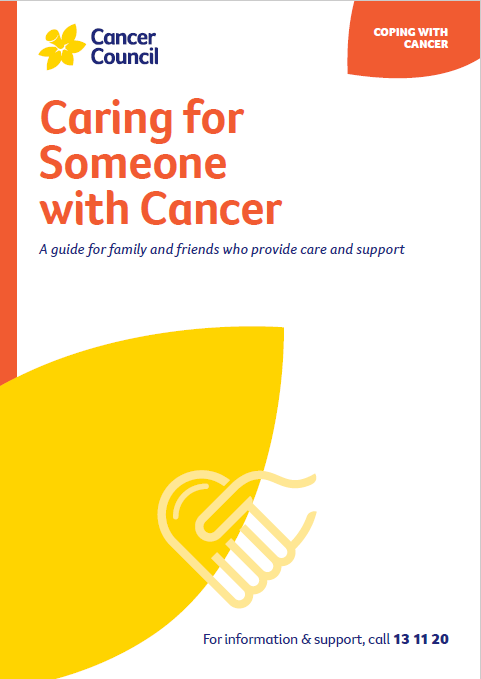- Home
- Cancer Information
- Advanced cancer
- Facing end of life
- Caring for someone who is dying
- Providing emotional support
Providing emotional support
The diagnosis of a terminal illness may be a crisis for family and friends. How everyone responds can depend on their relationship with the person dying and their own beliefs about death. It is natural to feel shocked, angry, scared, sad or relieved, or a combination of these emotions.
Learn more about:
Overview
You may be worried about discussing the end of life with the person who is dying because you think you’ll upset them. People who are dying often say they want to talk about what is happening but they are afraid the topic will upset their carer, family member or friend. So while starting the conversation can feel difficult, the opportunity to share feelings can be valuable for both of you.
As the person you are caring for nears the final days of life, there are still many ways to spend time together:
- sit with them without talking
- read a book
- look through old photo albums and talk about the pictures
- sing a song
- share some special memory or experiences you’ve had together
- tell them that you love them and that family and friends send their love.
For more on this, see When you don’t know what to say.
Anticipatory grief
When someone is ill for some time, it’s common for their family and friends to begin to grieve their death before it happens. This is known as anticipatory grief. You might find yourself wishing for the person’s life to be over. It’s also not unusual to start thinking about how you’ll cope, about other events in your life, the funeral, and so on.
All of these responses and thoughts are natural and okay. It may help to speak to a health professional or counsellor about how you’re feeling, or to call Cancer Council 13 11 20.
Saying goodbye
A life-limiting illness offers you time to say goodbye. You can encourage the person who is dying to discuss their feelings, and you can talk about your own in return. Sharing how you both feel can start important conversations that can be memorable. This is also an opportunity for you to tell the person who is dying what they mean to you and how you might remember them.
The person nearing the end of life may want to make a legacy, such as writing their life story or letters to family and friends. They may want to visit a special place or contact someone they’ve lost touch with. You can help the person with all these tasks. They are all part of the process of saying goodbye, for all of you.
→ READ MORE: When you don’t know what to say
Podcast: Living with Dying
Listen to more episodes of our podcast for people affected by cancer
More resources
Prof Jane Phillips, Head, School of Nursing and Professor, Centre for Healthcare Transformation, Queensland University of Technology and Emerita Professor Palliative Nursing, University of Technology Sydney, NSW; Prof Meera Agar, Palliative Care Physician, Professor of Palliative Medicine, University of Technology Sydney, IMPACCT, Sydney, NSW; Sandra Anderson, Consumer; A/Prof Megan Best, The University of Notre Dame Australia and The University of Sydney, NSW; Prof Lauren Breen, Psychologist and Discipline Lead, Psychology, Curtin University, WA; David Dawes, Manager, Spiritual Care Department, Peter MacCallum Cancer Centre, VIC; Rob Ferguson, Consumer; Gabrielle Gawne-Kelnar, Counsellor, Psychotherapist and Social Worker, One Life Counselling & Psychotherapy, NSW; Justine Hatton, Senior Social Worker, Southern Adelaide Palliative Services, Flinders Medical Centre, SA; Caitlin MacDonagh, Clinical Nurse Consultant, Palliative Care, Royal North Shore Hospital, Northern Sydney Local Health District, NSW; McCabe Centre for Law and Cancer; Palliative Care Australia; Belinda Reinhold, Acting Lead Palliative Care, Cancer Council QLD; Xanthe Sansome, National Program Director, Advance Care Planning Australia; Kirsty Trebilcock, 13 11 20 Consultant, Cancer Council SA.
View the Cancer Council NSW editorial policy.
View all publications or call 13 11 20 for free printed copies.
Need to talk?
Support services
Support for carers
Speak to a health professional or to someone who has been there, or find a support group or forum
Cancer Council Online Community
A community forum – a safe place to share stories, get tips and connect with people who understand
Cancer information
Advanced cancer
Information for all stages of advanced cancer, from the initial diagnosis to palliative care and grief
Information for carers
Information for family and friends providing care to someone at any stage of cancer

